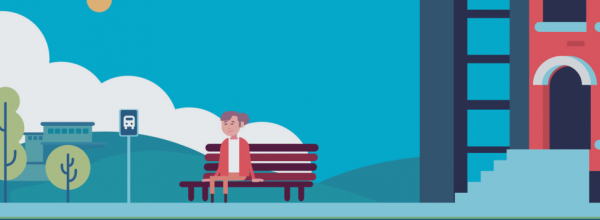The first step to success is simply showing up. Yet getting patients to show up to their medical appointments remains one of the biggest problems facing community health today.
To tackle this problem, Hennepin County Medical Center (HCMC) in Minneapolis and its innovations group, Upstream Health Innovations, developed Hitch Health, software that communicates with the electronic health record (EHR) and Lyft, a rideshare service. When an appointment has been made by a patient, a ride offer via an SMS text message is automatically sent to the patient based on filters that determine if they are eligible. By leveraging technology, this seamless approach is improving no show rates and increasing patient satisfaction.
An Expensive Problem
Medicaid spends $5 billion on non-emergency medical transportation (NEMT) to help patients travel to clinics each year, but 3.6 million Medicaid patients still miss their medical appointments, according to Hitch Health. When patients can’t find reliable transportation to visit their doctors, it puts their own wellbeing at risk. Skipped medical care disrupts continuity and compromises the quality of care, leading to an increased likelihood of emergency room visits and preventable hospital admission. At the same time, Hitch estimates that these no-show appointments cost health care systems $150 billion each year in lost clinic revenue and lost staff time. Sicker patients also put an enormous strain on resources.
Transportations Barriers
Hitch Health emerged from a human-centered design project, in which researchers used ethnographic techniques, interviewing Minneapolis patients, spending time in their homes, and following them to clinic appointments. Witnessing their transportation headaches first hand was an eye-opening experience. One patient who lived just a couple miles away from a clinic had to take three different public buses to get there. Those who owned cars struggled to find parking in downtown Minneapolis. Medicaid reimburses taxis, but the complex process required patients make multiple phone calls to set up the service, fill out a small mountain of paperwork, and wait multiple hours for a taxi to actually arrive. Many were forced to carve out an entire day just to travel to and from an appointment. On average, 19 percent of patients were missing their appointments – an extremely high no-show rate.
Getting A Lyft
Hitch contacted Lyft and became one of just seven organizations to access Lyft’s enterprise application programming interface (API), which allows Hitch to build on the ridesharing platform. The team developed a streamlined dispatch system – linking the EHR with existing rideshare technology – that doesn’t even require a smartphone. Multiple studies have found that SMS text messaging is the best way for the medical community to reach low-income patients. To take advantage of this high-impact, low-cost method of engagement, Hitch breaks down Lyft’s app into simple text message-based conversation.
How It Works
- Accessing the EHR, Hitch’s software determines which patients are eligible for a ride based on filters like insurance type, treatment, and condition.
- An eligible patient with an upcoming appointment automatically receives an SMS text message five to seven days before the scheduled visit offering a ride to the clinic. Instructions are in English, but Spanish is next. All the patient needs to do is respond “yes” to get picked up on the day of their appointment.
- The night before a reminder text is sent to the patient confirming the ride and the estimated time of pick up for the next day.
- On the day of their appointment, a patient will receive the Lyft driver’s information and pick up details all via text message.
- Meanwhile at the clinic, staff receive real-time status updates on when the patient will arrive. Hitch’s administrative frontline dashboard tool keeps appointments running smoothly and decreases wait times.
- When it’s time to go home, the patient texts “ready” and a Lyft driver will arrive in minutes.
Lessons Learned
- Hitch is not only more efficient, it’s less expensive for health plans. Taking a Lyft costs half as much as taking a taxi.
- Patients loved their Lyft drivers. The rideshare company’s focus on friendly customer service sold patients on using Hitch for their next appointments.
- During its first pilot program at HCMC in January, Lyft drivers were automatically sent to the addresses listed on patient records. But patients didn’t realize they needed to be home to use the service. Now, Hitch asks patients to confirm the address where they’d like to be picked up. If they aren’t home, they can text back their current location.
- Before, patients using Medicaid’s taxis service were so accustomed to waiting hours for a ride, they would go grab a sandwich to pass the time. Now, clinic staff will be encouraging patients to go to the entrance right away because their Lyft will be there in just minutes.
- Fraud is a big problem for Medicaid’s taxi service. Currently, there is no way for health plans to confirm taxi-bound patients have scheduled appointments. Hitch, however, verifies check-in for clinic visits through the EHR.
- Hitch set up a call center for patients who might have questions about this service. The patients primarily used the call center to verify that this was a real service because they thought it was “too good to be true.”
What’s Next?
- Later in 2017, Hitch will continue refining and scaling its technology through more pilot programs within the healthcare system. Building on its test at the Medicine Clinic, Hitch aims to continue to identify user needs and track impact over a period of time. At the Methadone Clinic, Hitch will learn how to enhance the middleware to handle no EHR appointments. And with the MRI Clinic, it will learn how to enhance the middleware to screen for appointment types.
- In July, Hitch will begin a pilot program with Hennepin Health, a managed care program that serves residents who are eligible for Medicaid and MinnesotaCare. The goal is to gain compliance for Safe Harbor rules and become a covered benefit for NEMT.
- Hitch is also in discussions with other health plans including Providence Health & Services and UnitedHealthcare Community & State. Hitch wants to eventually offer its software to safety net health plans around the country.
- Working to improve its EHR integration, Hitch will launch separate pilots with Epic and athenahealth.
Read More
- Hitch Health: hitchhealth.co
- Upstream Health Innovations: upstreaminnovations.org
- Hennepin County Medical Center: hcmc.org
- Lyft: lyft.com
Find this useful or interesting? We’re constantly sharing stuff like this. Sign up to receive our newsletter to stay in the loop.




